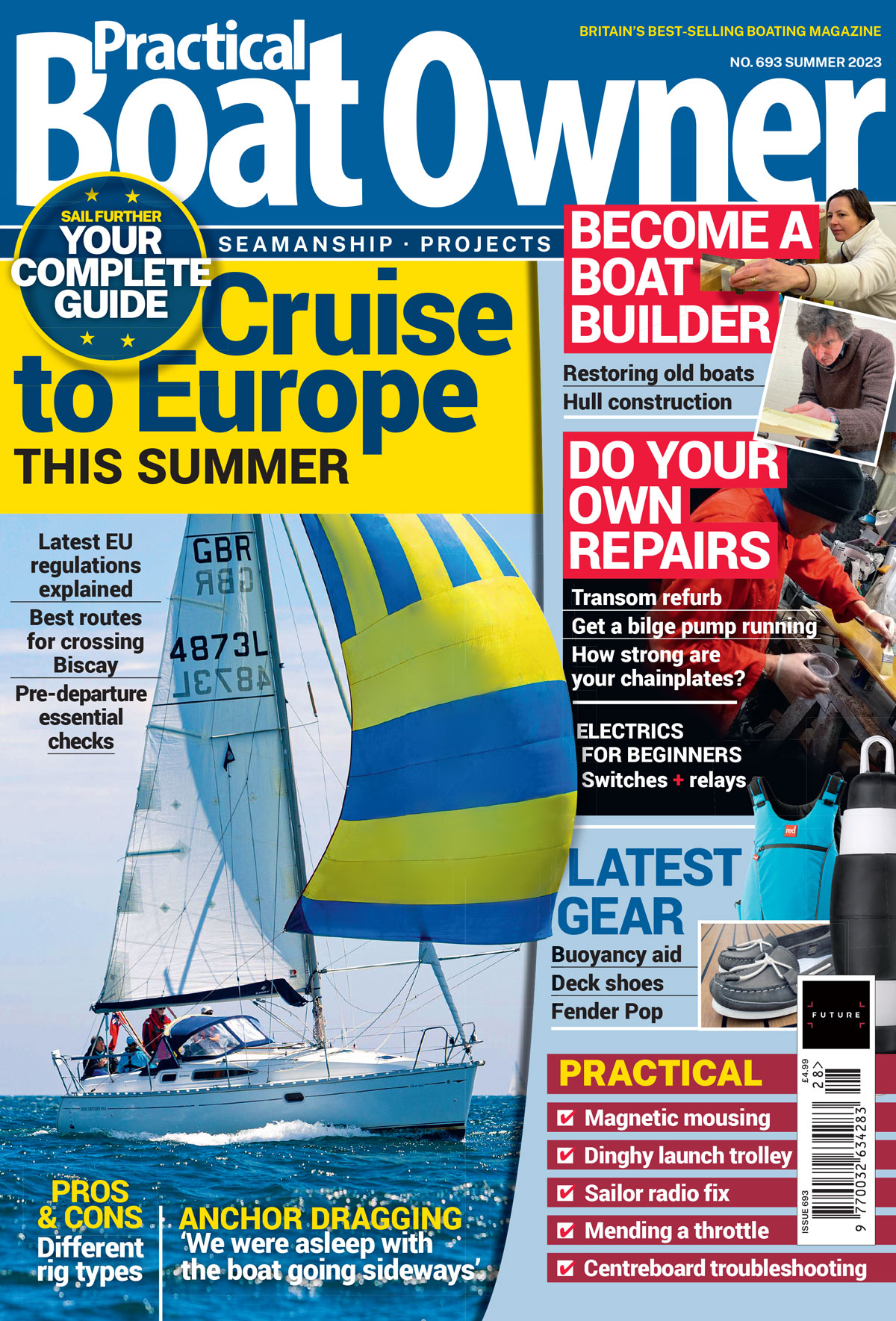With Calor discontinuing some of its gas cylinders, Barry Pickthall looks at the options available for boat owners with older vessels
Calor Gas alternatives for boat owners
The Calor decision to discontinue refilling its Cube, 3.9kg Propane, 4.5kg Butane, 6Lite Propane and 12kg Butane gas bottles ‘as part of the Company’s first steps to improving customer service’ has caused uproar among boat and camper van owners.
Many of the built-in gas lockers aboard older yachts were made specifically for 4.5kg bottles and are not easy to adapt to fit the taller 6kg cylinders.
Westerly and Moody owners have been voicing their disapproval both to Calor and on sailing forums.

Calor Gas says refilling some of its cylinders, including the 4.5kg butane cylinder, is no longer cost effective. Credit: Mark Green
One PBO reader launched a petition to no avail. Others have called the discontinued service: “Socially appalling. The redundant bottles will be left dumped everywhere – It will be worse than the trekking paths up to Everest.”
Others question “What about the deposit I paid on the first bottle of gas?”
As the owner of a wooden classic affected by the changes and about to set out on an extended summer cruise from Chichester to the Western Isles and back, I sought answers from Peter Spreadborough, the marine gas fittings expert at the Southampton Calor gas centre (SoCal), the largest distributor in the South.
“Calor Gas are not about to change their minds. These smaller bottles are no longer economical to refill,” he told me.
“It only affects older boats. Many modern vessels, particularly the French boats, have large self-draining gas lockers that were designed to take the Campingaz bottles so it’s not really an issue for their owners,” he says.
What are the Calor Gas alternatives for boat owners?
Flogas produces a 4.5kg bottle that will fit in the same space as the 4.5kg Calor cylinder and refills are available from Flogas stockists around the UK.
A 4.5kg bottle costs £38.50 + £28.00 for the gas, £13.99 for a regulator and an additional market volatility surcharge of £4.70, making a total of £83.53 per bottle.
Flogas stockists can’t exchange Calor gas bottle for like-for-like replacements, as the cylinders belong to Calor.
It can exchange any Flogas or Flogas-owned brand (listed here: www.flogas.co.uk/gas-bottles/brands) free of charge.
Anyone looking to move to Flogas will need to pay a cylinder charge at the stockist of their choice as well as the cost of the gas.

Alternatives to Calor Gas: The kit now installed on Sea Jay, replacing the two redundant 4.5kg Calor cylinders: 2 x Campingaz R907 bottles; 1 x GasBoat 4005 marine regulator; BSEN16436-1 type 2 gas hose. Max run 1m; Neptune 4900 stove. Credit: Barry Pickthall
Perhaps the best solution, according to Spreadborough, is to replace the old 4.5kg Calor gas system with Campingaz R907 cylinders which are readily available across the UK, Europe, the Caribbean and North America.
This is a more expensive option, and the bottles have a wider diameter base ring than the old Calor ones.
The cylinders, which take only 2.72kg of mixed butane/propane, cost £35.00 each, the gas is £47 – twice the price of Calor gas – and the GasBoat 4005 marine regulator is £45, making a total of £127 – ouch!

The British Standard BSEN16436-1 class 2, and production date is printed on the gas hose. Limit the run of hose to 1m length. There’s no specific end of use date, but check for wear regularly. Credit: Barry Pickthall
There is no deposit on the Campingaz bottles but, as with Flogas, they can be swapped for a full bottle at Campingaz stockists.
I had thought about biting the bullet and swapping the two 4.5kg Calor bottles that live neatly in Sea Jay’s lazarette for a single 6kg bottle to sit under the tiller at the back of the cockpit. Being out in the open, that would have solved the gas drainage issue, but the bottle is unsightly and more importantly exposed to pilfering.
The 6kg bottle also requires a different regulator to the 4.5kg container.
These are the costs: 6kg bottle £60, Propane gas £42, marine regulator £60: total £162.00
I also had to consider if a 6kg Calor bottle would fit in my locker. A 6kg bottle has a height of 495mm, diameter 256mm and weight of 17kg when full.
Continues below…
Calor Gas: Longer phase out time for 4.5kg & 3.9kg cylinders
Calor Gas has confirmed that although it will discontinue its 4.5kg butane and 3.9kg propane cylinders, the phasing out period…
Best boat cooker: 10 alternative options for gas-free cooking
Gas cookers used to be the standard choice on almost every boat, but there are good reasons why they are…
Spirit stove installation: How make your boat’s galley safer and cheaper to run
Garry Flashman swaps gas for meths to make cooking and a cuppa much safer, easier and cheaper on his replica…
“It’s alarming how quickly the fire grows” – Warning over camping stove use on boats
A quick brew turned into a frightening fire aboard a classic wooden boat for PBO contributor Max Liberson.
Return deposits on empties
There is better news for those of us who paid a deposit on our Calor gas bottles and no longer have the receipts.
My local Calor distributor offered to swap the old 4.5kg bottles for 6kg cylinders at no additional cost. SoCal offers a discount to those changing from 4.5kg Calor Gas to the R907 Campingaz bottles.
So, there is no excuse for fly tipping redundant bottles across the countryside.
Calor stockists will take the no longer wanted empty bottles… and so will your community tip.
Replacing the system
While replacing the boat’s gas system, we chose to renew the rubber gas hose linking our stove, and the bottles.
I’d been advised that these should be replaced anyway at five-yearly intervals and walked into SoCal rather shame-faced with one hose dated 2008 and the other 2012.

The marine regulator has an on/off knob with a safety lock that has to be pressed in to open the valve. The white plastic screw-in ‘snorkel’ is optional, designed to keep the gas flowing in the event of a flooded locker. If my gas locker ever floods, my first thought would be to abandon ship, rather than make a cup of tea!. Credit: Barry Pickthall
“That’s not a problem,” Peter Spreadborough assured me. “The date on the hose is the date of manufacture, so long as it has been stored away from ultraviolet light, there is no shelf or service life.”
The advice of the UK LPG Trade Association for installations is:
- Maximum length of hose run should be limited to 1m
- It is essential that LPG hose/tubing and end connections meet BS3212 part 2 or BSEN16436-1 type 2 and 3 standards and are inspected regularly and replaced if showing signs of:
- Physical damage such as cuts or abrasion, cracking, stretching, flattening, kinking and, where fitted, missing/worn sealing washers or damaged cylinder connections
- Environmental deteriorations such as stiffening, cracking, delamination of outer covering, chemical degradation, ie: softening of outer coating by contact with oil
- Hose failure such as blistering, soft spots, rupture and for pre-assembled fittings, corrosion or loosening of swaged fittings attaching hose
The key is regular inspection for signs of deterioration.
It’s okay to replace the bottles and fit new hoses yourself, but Peter strongly advises getting a local Gas Safe registered engineer to certify the work.
Not to do so could invalidate your boat insurance for any gas related claim. gassaferegister.co.uk
One final word of caution.
It is possible to purchase connectors to refill a 4.5kg Calor gas bottle from a larger one, but the short answer is DON’T.

Regardless of what you choose to replace your redundant Calor gas bottle with, make sure there is plenty of gas drainage. Credit: Graham Snook/Yachting Monthly
This may be what they do overseas, but it is very DANGEROUS.
Best to bite the bullet and pay for new bottles rather than suffer singed hair – or worse!
This article has been amended as Flogas stockists can’t exchange Calor gas cylinders as they belong to Calor
Enjoyed reading Calor Gas alternatives for boat owners?
A subscription to Practical Boat Owner magazine costs around 40% less than the cover price.
Print and digital editions are available through Magazines Direct – where you can also find the latest deals.
PBO is packed with information to help you get the most from boat ownership – whether sail or power.
-
-
-
- Take your DIY skills to the next level with trusted advice on boat maintenance and repairs
- Impartial in-depth gear reviews
- Practical cruising tips for making the most of your time afloat
-
-








